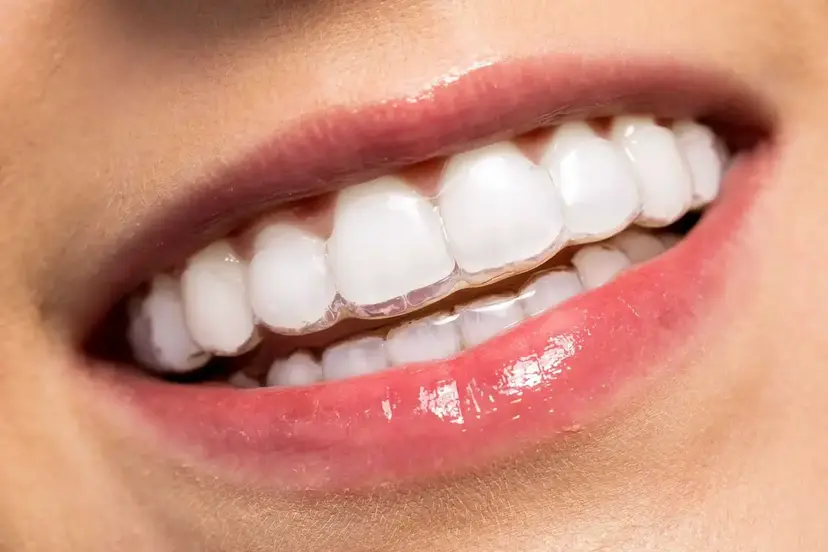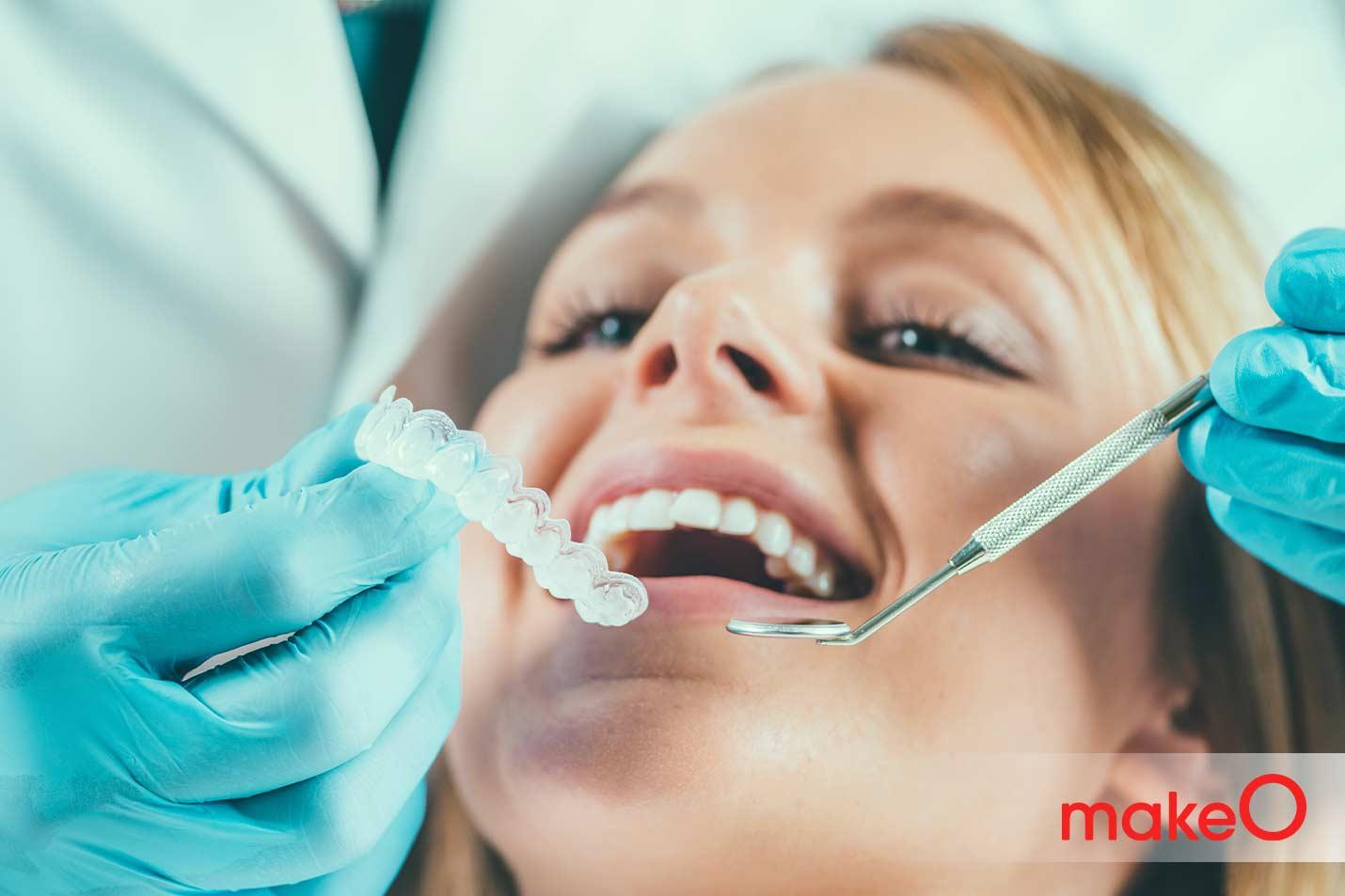MakeO blog
A bright, white smile can have a significant impact on our confidence and also leave a lasting impression. It's no wonder that teeth whitening has become immensely popular in recent years. However, for those with sensitive teeth, the thought of undergoing a teeth whitening procedure can be both tempting and terrifying. Sensitive teeth can react adversely to certain treatments, causing discomfort and pain. But does that mean you have to forgo the dream of a dazzling smile? Not necessarily. In this blog, we will explore the intricacies of sensitive teeth whitening and uncover whether it's a safe and viable option for you.
How do sensitive teeth react to teeth whitening?
Before finding out the best teeth whitening for sensitive teeth, it's essential to understand how sensitive teeth differ from regular teeth and how they react to certain whitening treatments.
1. Heightened Sensitivity
Sensitive teeth are characterised by a heightened response to external stimuli, such as temperature changes, acidic foods and teeth whitening agents. The enamel of sensitive teeth is often thinner, exposing the underlying dentin, which contains microscopic nerve endings.
2. Discomfort and Pain
When exposed to teeth whitening agents, sensitive teeth can experience heightened discomfort and pain. The bleaching agents used in teeth whitening treatments can penetrate the enamel and reach the nerve endings, causing temporary sensitivity.
3. Gum Irritation
Sensitive teeth are often accompanied by sensitive gums. The whitening agents can irritate the gums, leading to redness, swelling, and discomfort during and after the treatment.
4. Uneven Whitening
Due to the nature of sensitive teeth, the whitening process might yield uneven results. Areas with thinner enamel may whiten faster than the rest, leading to an inconsistent appearance.
5. Tooth and Enamel Damage
Excessive and improper use of teeth whitening products can potentially damage the tooth enamel, making the teeth even more sensitive and susceptible to decay.
6. Allergic Reactions
Some individuals may be allergic to certain ingredients present in teeth whitening products, leading to allergic reactions and oral discomfort.
Teeth whitening tips for sensitive teeth
While the process of sensitive teeth whitening teeth whitening can be challenging for some, there are several tips and precautions that can help minimise discomfort and ensure a safer experience:
1. Consultation with a Dentist
Before starting the best teeth whitening for sensitive teeth, consult your dentist. They can evaluate the level of sensitivity and recommend suitable whitening options or alternatives.
2. Desensitising Toothpaste
Begin using desensitising toothpaste a few weeks before the sensitive teeth whitening procedure. These toothpaste formulations can help reduce sensitivity and prepare your teeth for treatment.
3. Choose Gentle Whitening Agents
Opt for teeth whitening products that are specifically designed for sensitive teeth. These products contain milder bleaching agents and are less likely to cause excessive sensitivity.
4. Avoid Acidic and Hot/Cold Foods
During the whitening process, avoid consuming acidic foods and beverages, as well as hot or cold items, to reduce the chances of aggravating sensitivity.
5. Follow Instructions Carefully
If you're using an at-home whitening kit, carefully follow the instructions provided. Avoid overusing the product, as it can lead to more sensitivity and enamel damage.
6. Teeth whitening kits
makeO toothsi offers teeth whitening kits that can be used at home by anyone and are even suitable for people with sensitive teeth. It is easy, safe and comfortable for all.
Choose makeO toothsi teeth whitening kit
If you have sensitive teeth, the teeth whitening kit from makeO toothsi might just be your best bet. This kit is specially formulated for people with sensitive teeth and offers a gentle yet effective whitening solution. The makeO toothsi kit comes with 3 whitening pens, a mouth tray, LED Light, a PVC Shade card and a user manual. You can easily perform teeth whitening at home without anyone’s help with this simple, easy-to-use and highly effective kit. With makeO toothsi, you can achieve a radiant smile without compromising on dental health or comfort.
Conclusion
Teeth whitening for sensitive teeth is indeed possible, but it requires caution and proper care. It's essential to understand the unique needs of sensitive teeth and select appropriate products and treatments. Before embarking on any teeth whitening journey, consult with your dentist to determine the best course of action for your individual needs. With the right approach and the help of products like makeO toothsi Teeth Whitening Kit, you can confidently brighten your smile and embrace the newfound confidence that comes with it.
FAQs
Can I undergo professional teeth whitening if I have sensitive teeth?
Professional teeth whitening can be done for individuals with sensitive teeth, but it should be done under the supervision of a dentist who can use specialised techniques and products to minimise sensitivity.
Are there any natural remedies for teeth whitening suitable for sensitive teeth?
Some natural remedies, such as brushing with a baking soda paste or using hydrogen peroxide in diluted form, may help whiten teeth. However, these remedies should be used with caution and in consultation with a dentist to avoid aggravating sensitivity.
How long does teeth sensitivity last after whitening?
Teeth sensitivity after whitening is usually temporary and should subside within a few days. Using toothpaste made for sensitive teeth and avoiding triggers can help eliminate discomfort.
Are over-the-counter whitening products safe for sensitive teeth?
Over-the-counter whitening products designed for sensitive teeth can be safe when used as directed. However, it's essential to read product labels and follow instructions carefully to avoid potential side effects.
Can I whiten my teeth if I have sensitive gums?
Yes, you can whiten your teeth if you have sensitive gums, but it's crucial to be extra cautious. Choose products like makeO toothsi Teeth Whitening Kit with custom-fit trays to minimise gum contact and irritation. To be sure, always consult with your dentist for personalised guidance.
related categories
Related articles

Types of Braces: Removable vs Fixed Braces, Which is Right For You?

This Diwali, Smile Bright With makeO Teeth Whitening Kit

Dr. Pravin Shetty: Pioneer in Lingual Orthodontics & Innovative Smile Solutions
How do I Know I’m the Right Candidate for makeO toothsi Teeth Aligners?

